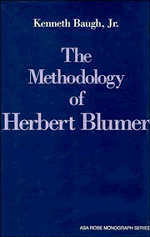1 - What is methodology?
Published online by Cambridge University Press: 15 December 2009
Summary
Like many other technical and quasi-technical terms in the social sciences, the word “methodology” has no single, uniform meaning. We must begin therefore with an attempt to become clear about Blumer's definition of it.
For Blumer, the methodology of science, in its most general expression, is the self-reflection of the scientific enterprise, that is, the study of the principles which underlie scientific inquiry (1969b: 24). This definition implies that, as with every self-reflective endeavor, methodology has an indefinite boundary. Its further reaches pass into the philosophical provinces of logic, epistemology, and ontology, blending fully into the array of their discourses. For this reason, Blumer's statement defining methodology begins with a discussion of idealism and realism (1969b: 21–2).
On the other hand, methodology is at least provisionally sited in a more familiar place. As the self-reflection of scientific inquiry, methodology is directed to recognize that inquiry in its entirety. From standard practice, Blumer gleans some key elements which fall into the proper focus of methodology: establishing a perspective for viewing the empirical world, raising research problems within that perspective, deciding on appropriate data and the methods for their collection, and prefiguring a framework for interpreting the findings of research (1969b: 26). Methodology addresses these matters not by enacting them, but by developing the principles according to which they are enacted.
- Type
- Chapter
- Information
- The Methodology of Herbert Blumer , pp. 1 - 4Publisher: Cambridge University PressPrint publication year: 1990

